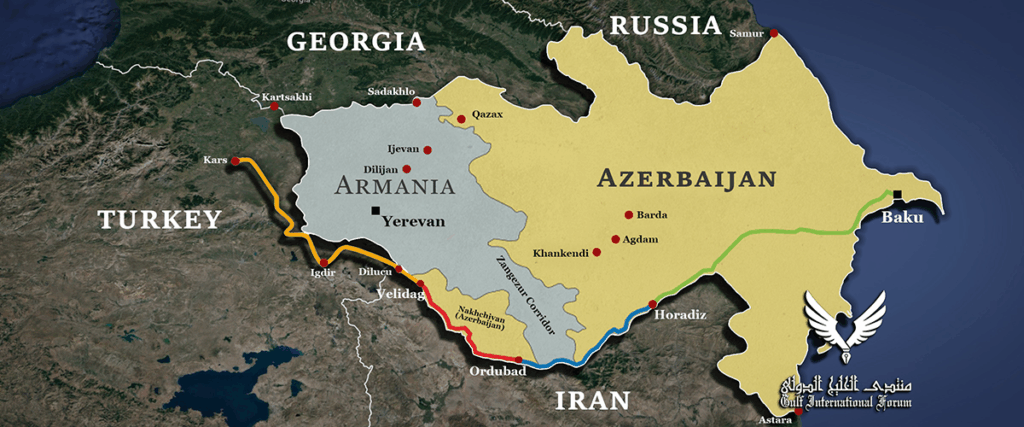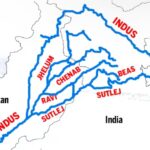Zangezur Corridor: Geopolitical and Strategic Implications for India
The aftermath of Operation Sindoor– a recent counter-terrorism operation in Jammu & Kashmir has drawn attention to broader geopolitical tensions, including the proposed Zangezur Corridor in Armenia. This corridor, backed by Azerbaijan and Turkey, has raised India’s strategic concerns because of its implications for regional security, trade routes, and India’s partnerships, especially with Armenia and Iran.

Background
What is the Zangezur Corridor?
A proposed land corridor through Armenia’s Syunik Province connecting Azerbaijan to its Nakhchivan exclave, cutting across Armenian territory.
Supporters:
- Azerbaijan and Turkey are pushing for this corridor to facilitate a direct route without Armenian customs or border control.
- Geopolitical Importance:
The corridor is approximately 43–44 km long, near the Iran-Armenia border, making it strategically significant for regional connectivity.
Controversy: Azerbaijan views it as a rightful post-war claim after the 2020 Nagorno-Karabakh conflict victory. - Armenia demands full sovereignty over transport in its territory, rejecting any bypass that undermines its control.Turkey sees it as part of its broader Middle Corridor project linking Europe and Central Asia by land.
Opposition:
- Armenia and Iran oppose the corridor, fearing: Isolation of Armenia, weakening its security,
Loss of Iran’s access to the region, - Threats to Armenia’s territorial integrity.
Features
- The corridor would give Azerbaijan a direct land link to Nakhchivan, cutting through Armenia.
- It challenges Armenia’s sovereignty and regional balance.
- Turkey’s backing ties into its goal of expanding regional influence and offering alternative routes bypassing Russia and traditional routes.
- Iran fears loss of regional influence and access near its border.
- India, as Armenia’s key defence partner and a supporter of regional stability, has strategic interests linked to this corridor.
Why is India Concerned?
- Strategic Ties:
India supports Armenia militarily and politically, viewing regional stability as crucial for countering the adverse influence of Turkey and Pakistan. - Trade Route Ambitions:
India is developing the Chabahar Port in Iran to connect to Afghanistan and Central Asia. The Iran–Iran-Armenia-Georgia corridor is vital for India’s trade access to Europe, bypassing Pakistan and the Suez Canal. - Potential Impact of Zangezur Corridor:If Azerbaijan and Turkey bypass Armenian control, it could: Disrupt India’s overland trade routes through Iran and Armenia to Europe,
Reduce Iran’s regional access, weakening a key Indian ally,
Curtail India’s strategic reach into Eurasia. - Larger Geopolitics:Turkey’s and Azerbaijan’s growing influence is a strategic challenge to India’s India-Middle East-Europe Corridor (IMEC) project. India opposes any unilateral moves undermining Armenia’s sovereignty or the regional balance.
Way Forward
- Firmly support Armenia’s sovereignty and territorial integrity, opposing unilateral actions on the corridor.
- Work diplomatically to protect and strengthen the Iran-Armenia-Georgia route to secure India’s trade ambitions.
- Engage multilaterally to maintain regional stability and counterbalance Turkish-Azerbaijani influence.
- Monitor the evolving geopolitical dynamics post-Operation Sindoor to ensure India’s strategic and economic interests are safeguarded.
PRELIMS PRACTICE QUESTION
Question: The proposed Zangezur Corridor, recently in the news, aims to connect:
A. Armenia to Georgia via Turkey
B. Azerbaijan to Nakhchivan through Armenia
C. Iran to Turkey through Armenia
D. Turkey to Central Asia via Iran
Answer: B
Explanation: The Zangezur Corridor is a proposed land route through Armenia’s Syunik Province connecting Azerbaijan to its Nakhchivan exclave.







